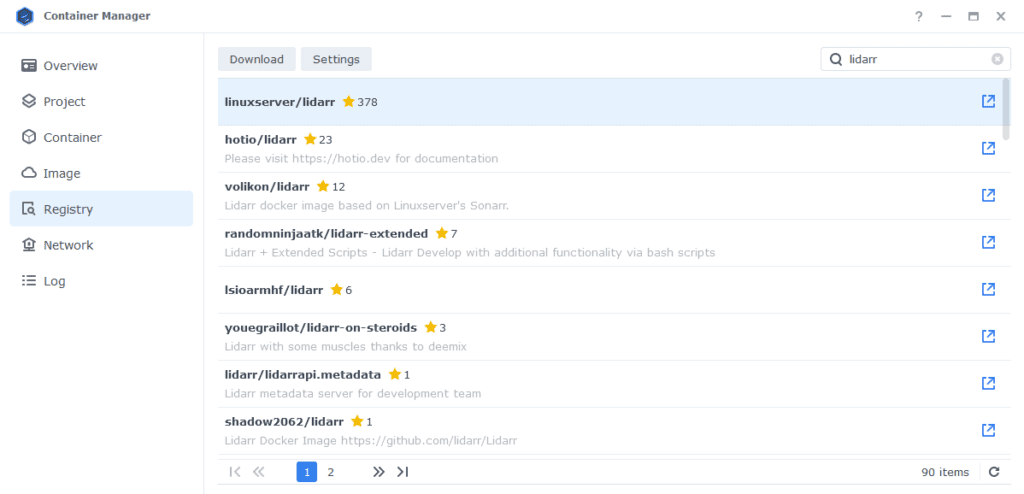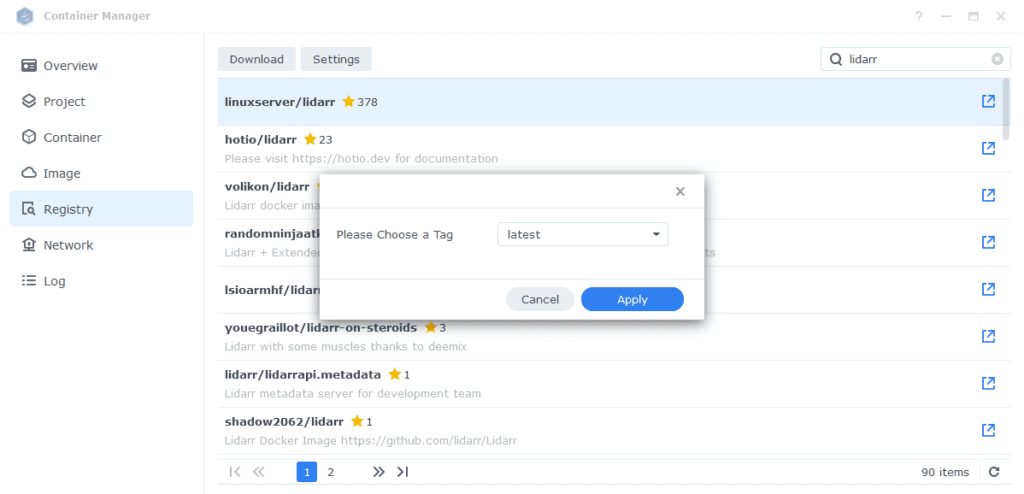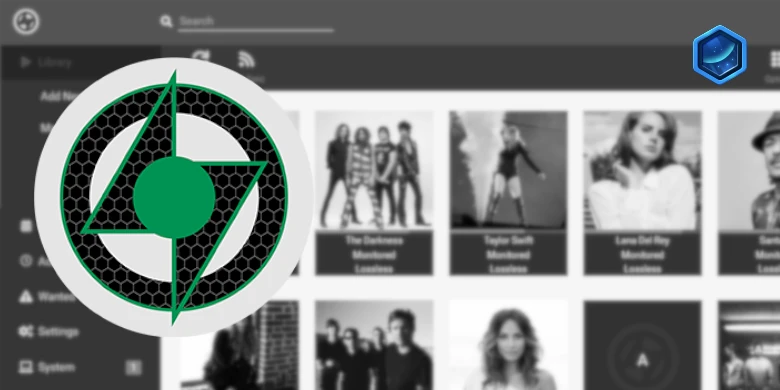This guide is now archived and not receiving updates Use the new all in one Arr's Project
| Update | Date |
|---|---|
| New guide update for DSM7.2 and Container Manager | 29/04/2023 |
What is Lidarr?
Lidarr is used to search, download and organise your Music in conjunction with your preferred Usenet or Torrent downloaders and indexers.
Let’s Begin
In this guide I will take you through the steps to get Lidarr up and running in Docker.
In order for you to successfully use this guide please complete the three preceding guides
- Docker Package, SSD and Memory Recommendations
- Step 1: Directory Setup Guide
- Step 2: Setting up a restricted Docker user
- Step 3: Setting up a Docker Bridge Network (synobridge)
Downloading the Lidarr Image
Open up Container Manager within DSM and navigate to the ‘Registry’ tab and search for ‘Lidarr’. In the list of available containers select the one made by Linuxserver as shown below then click ‘Download’.

The pop-up box will ask which version you want to download, make sure you choose ‘Latest’ from the list of available versions.

You will automatically be taken to the ‘Image’ tab once the download has completed select the image and click ‘Run’.
General Settings
Next you will be greeted with the General Settings screen, this is where you can start specifying some of your preferences.
You can change the name of the container to anything you like, and you may want to enable Auto Restart as this will ensure Lidarr starts automatically if you reboot your NAS.
We won’t need to change any other settings on this screen. We are now going to work through the remain settings. Click on Next.

Port Settings
We won’t be changing any of the ports the container uses. You can repeat the one shown on the right side of the settings page which is the internal Container Port onto the left side which is the Local Port which is the one you will access in your browser. Now move to the next section.

Volume Settings
We will now be specifying the directories where Lidarr will store its configuration files and where to find our media and downloads.
Click on ‘Add Folder’ select the ‘docker’ folder and create a new sub-folder called ‘lidarr’ select this folder and click ‘select’
Repeat this process to add the /data folder.

You will notice the section next to each folder is blank, we need to add a ‘Mount Path’ which maps the folders to a folder within the container. Use the ones shown below.
| File/Folder | Mount path |
|---|---|
| /docker/lidarr | /config |
| /data | /data |

We can now move to the next section.
Environment (PGID, PUID and Timezone)
Next we are going to set up a couple of environment variables that docker will use to allow the container access to our files and folders and also to tell it where we live in the world.

Click the Add button, and fill in the following details as per the table/screenshot.
| Variable | Value |
|---|---|
| PUID | The UID you obtained in the user setup guide |
| PGID | The GID you obtained in the user setup guide |
| TZ | Your timezone wikipedia.org/wiki/List_of_tz_database_time_zones |

Capabilities
Nothing to change here leave at the default selection.

Network
In the Network section choose the ‘synobridge’ from the drop-down menu that we created earlier.

Execution Command / Links
Leave both of these section with their default settings.

Press ‘Next’ to go back to the Final Summary screen.
Summary
You have now completed the setup of the container.
You will be shown an overall summary of the settings we have specified, this is a good time to double-check everything is correct. Finally, click on Done and the container should start to boot.

You should now be able to access Lidarr via the IP of your NAS followed by the port 8686
e.g. 192.168.0.40:8686
Key Settings and FAQ
Now you have set up Lidarr there are some key settings you will need to set as these often catch new users out. I will add more as they come up.
Media Management / Root Folders (Settings>Media Management)
Lidarr refers to the place(s) you keep your music as Root Folders. These are where Lidarr will ultimately move your music files once they finish downloading.
| App | Root Folder |
|---|---|
| Lidarr | /data/media/music |
Download Clients (Settings > Download Clients>Remote Path Mappings)
While most of the settings on this page are self-explanatory something that has caught people out if the Remote Path Mappings setting. If you are hosting all your services on the same NAS do not add any settings here.
I can’t get Lidarr to Connect to my Download Client!
When setting up your preferred download client or Prowlarr etc. Usually you will use the IP of your NAS, however if for whatever reason this is not working you can use http://172.20.0.1 which is the IP of the ‘synobridge’ gateway.
Docker Compose
You can use the below code saved as lidarr.yml in the ‘/docker’ share, this will do the entire process above in one quick command via SSH. Ensure you change the variables to your own.
services:
linuxserver-lidarr:
image: linuxserver/lidarr:latest
container_name: lidarr
environment:
- PUID=YOURUID
- PGID=YOURGID
- TZ=YOURTIMEZONE
volumes:
- /volume1/data:/data
- /volume1/docker/lidarr:/config
ports:
- 8686:8686
network_mode: synobridge
restart: unless-stoppedsudo docker-compose -f /volume1/docker/lidarr.yml up -d| Historic Updates | Date |
|---|---|
Looking for some help, join our Discord community
If you are struggling with any steps in the guides or looking to branch out into other containers join our Discord community!
Buy me a beverage!
If you have found my site useful please consider pinging me a tip as it helps cover the cost of running things or just lets me stay hydrated. Plus 10% goes to the devs of the apps I do guides for every year.




Be First to Comment